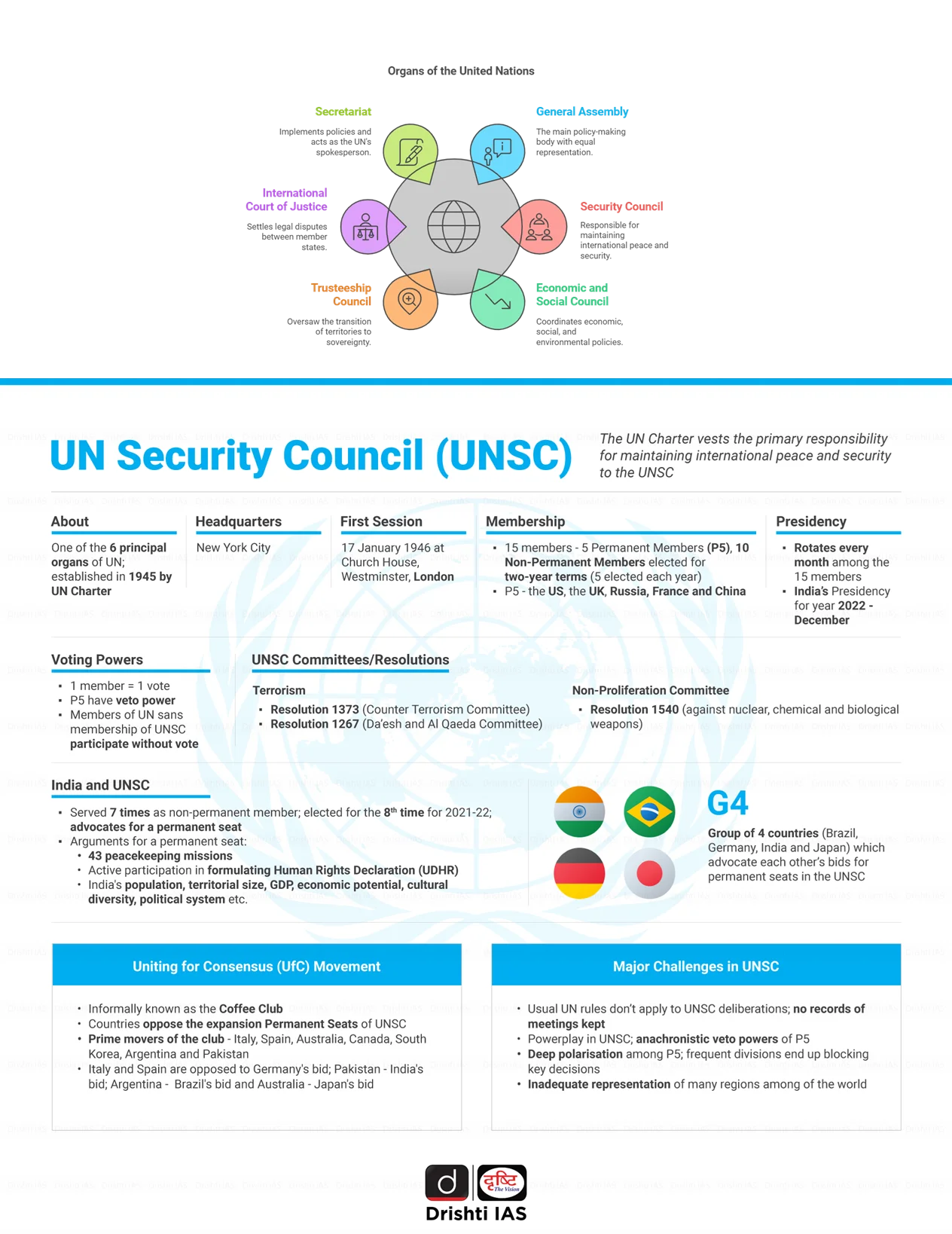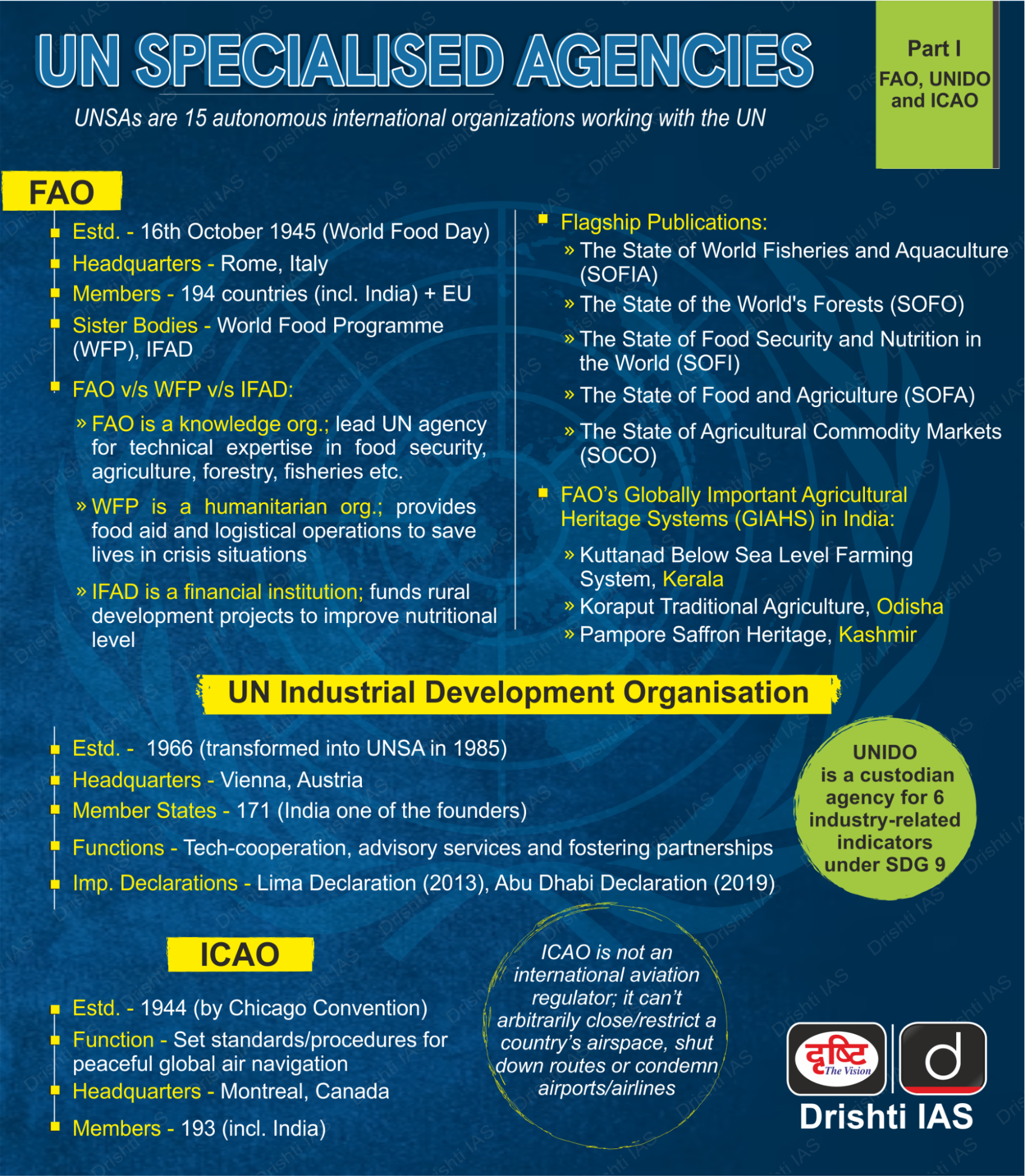United Nations Day 2025 | 24 Oct 2025
Why in News?
The world marks United Nations (UN) Day on 24th October 2025, celebrating 80 years since the UN was established in 1945. The day commemorates the entry into force of the UN Charter, officially bringing the United Nations into being.
What are the Key Facts About the United Nations?
- About: The UN is an intergovernmental organization established after World War II, succeeding the League of Nations to promote global peace, security, and cooperation through its various specialized agencies.
- The UN Charter was signed 26 June 1945, in San Francisco, at the conclusion of the United Nations Conference on International Organization, and came into force on 24 October 1945, a date now celebrated annually as United Nations Day.
- The UN Charter was ratified by 51 nations, including the five permanent Security Council members (US, UK, USSR/Russia, China, France).
- Evolution: Membership has grown from 51 countries(1945) to 193 countries (2025). India is a founding member of the United Nations. Its headquarters is located in New York City, US
- Expanded focus to include health, environment, gender equality, human rights, and sustainable development.
- Responded to global crises like pandemics, refugee movements, and climate change.
- Core Goals: Maintain international peace and security.
- Develop friendly relations among nations.
- Achieve international cooperation in solving global problems.
- Act as a center for harmonizing actions of nations to reach common objectives.
Key Achievements of UN
- Peacekeeping and Conflict Resolution: UN deployed over 70 peacekeeping missions since 1948 in conflict zones like Congo, Lebanon, and South Sudan.
- The Nobel Peace Prize 1988 was awarded to United Nations Peacekeeping Forces for preventing armed clashes and creating conditions for negotiations.
- Decolonization and Nation-Building: Supported the independence of more than 80 countries, mainly in Asia and Africa, fostering self-determination and sovereignty.
- Human Rights Protection: UN adopted the Universal Declaration of Human Rights (1948) and established bodies like the Human Rights Council (2006) and International Criminal Court (ICC) to uphold justice and accountability.
- Global Health and Humanitarian Aid: Through World Health Organization (WHO), UN led eradication of smallpox and coordinated global Covid-19 response under COVAX.
- UN agencies like World Food Programme (WFP) and United Nations High Commissioner for Refugees(UNHCR) provide food, shelter, and protection to millions affected by war and disasters.
- Sustainable Development and Poverty Reduction: UN introduced Millennium Development Goals (MDGs) (2000–2015) and Sustainable Development Goals (SDGs) (2015–2030) to reduce poverty, promote equality, and ensure global progress.
- Climate and Environmental Action: UN facilitated key global accords such as the Paris Agreement (2015) and established the Intergovernmental Panel on Climate Change (IPCC) in 1988.
- International Law and Justice: UN strengthened rule of law through the International Court of Justice (ICJ) and conventions like United Nations Convention on the Law of the Sea (UNCLOS) and Geneva Conventions..
- Education and Social Welfare: United Nations Educational, Scientific and Cultural Organization (UNESCO) promotes global education and cultural preservation, while United Nations International Children's Emergency Fund (UNICEF) safeguards children’s rights and welfare.
|
Click here to Read : India Calls for UN Reforms at 80th UNGA Session |
Frequently Asked Questions (FAQs)
1. What is United Nations Day and why is it observed?
United Nations Day is observed on 24th October to mark the entry into force of the UN Charter in 1945. It commemorates the UN’s founding purpose of maintaining international peace and cooperation.
2. Who are the five permanent members of the UN Security Council?
United States, United Kingdom, Russia (formerly USSR), China, and France.
3. What are the main development frameworks introduced by the UN since 2000?
The Millennium Development Goals (MDGs) (2000–2015) and Sustainable Development Goals (SDGs) (2015–2030).
UPSC Civil Services Examination, Previous Year Questions (PYQs)
Prelims
Q. With reference to the “United Nations Credentials Committee”, consider the following statements: (2022)
- It is a committee set up by the UN Security Council and works under its supervision.
- It traditionally meets in March, June and September every year
- It assesses the credentials of all UN members before submitting a report to the General Assembly for approval.
Which of the statements given above is/are correct? (2022)
(a) 3 only
(b) 1 and 3
(c) 2 and 3
(d) 1 and 2
Ans: (a)
Q. With reference to the United Nations, consider the following statements: (2009)
- The Economic and Social Council (ECOSOC) of the UN consists of 24 member States.
- It is elected by a 2/3rd majority of the General Assembly for a 3-year term.
Which of the statements given above is/are correct?
(a) 1 only
(b) 2 only
(c) Both 1 and 2
(d) Neither 1 nor 2
Ans: (b)
Mains:
Q. What are the main functions of the United Nations Economic and Social Council (ECOSOC)? Explain different functional commissions attached to it. (2017)
Q. Discuss the impediments India is facing in its pursuit of a permanent seat in the UN Security Council (2015)


